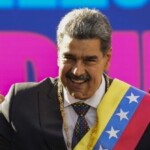Impeached South Korean President Yoon Suk-yeol did not attend his first impeachment hearing on Tuesday, reportedly out of fear for his security, making it impossible for the Constitutional Court to address most of the issues presented before it today.
Yoon was impeached in December after abruptly attempting to impose martial law on the country. Yoon, a conservative, appeared on national television on December 3 and announced that martial law was necessary because the leftist Democratic Party, which is the majority in the National Assembly, was obstructing his legislative agenda.
“I declare martial law to protect the Republic of Korea from the threats of North Korean communist forces,” Yoon proclaimed, “to immediately eradicate the unscrupulous pro-Pyongyang anti-state forces that pillage the freedom and happiness of our people and to protect free constitutional order.”
The martial law decree lasted only hours as lawmakers scrambled to break into the National Assembly and vote against it. While the National Assembly has the power to vote down martial law, the martial law decree made all political activity illegal and soldiers surrounded the legislative chamber to prevent deputies from convening. They did so anyway and ended martial law status.
Immediately after the implementation of martial law, even the leadership of Yoon’s own People Power Party (PPP) supported impeaching him. After two attempts, the Democrats succeeded in beginning the impeachment process, which installs an interim president until the Constitutional Court decides to affirm or reject the request to oust the impeached head of state. The Democrats impeached interim President Han Duck-soo in late December for allegedly slowing down Yoon’s impeachment process, apparently turning the tide against impeachment as thousands gathered in Seoul to protest the impeachments of both Han and Yoon in early January.
To be removed from office, the Constitutional Court must rule in favor of ending Yoon’s presidency. The Court has 180 days from the initial impeachment vote in the National Assembly, December 14, to decide. It can choose to either reinstate the president, in which case Yoon will continue his term as if no impeachment had occurred, or to oust him, triggering a special election within 60 days.
The Court held its first hearing on the matter on Tuesday. Yoon chose not to attend, which forced the Court to shut down the hearing in four minutes. The hearing reportedly only addressed one issue: a request by Yoon’s attorneys that Justice Chung Kye-sun recuse herself because she had previously worked at a progressive legal institution, allegedly indicating a bias against the conservative Yoon. The Court unanimously rejected the recusal request, according to the South Korean agency Yonhap.
The president of the Constitutional Court, Moon Hyung-bae, then shut down the hearing but announced that the court would reconvene again on Thursday – and, this time, the hearing would proceed regardless of whether Yoon chose to attend or not.
The Korea Herald reported that Yoon had initially planned to attend the hearing, according to his attorneys, but on Sunday reconsidered out of fear for his security. Yoon’s lawyers, it said, “argued that investigators might attempt to execute an arrest warrant for Yoon if he appeared at the court in Jongno-gu, Seoul.”
Authorities issued an arrest warrant for Yoon on the last day of 2024 on charges of insurrection, which are not subject to executive immunity. Law enforcement authorities attempted to arrest Yoon on that day, triggering a nearly six-hour standoff with the Presidential Security Service (PSS). The PSS argued that executing a warrant in the presidential residence is a national security threat, as the home of the president is inherently a sensitive military and national security site. The PSS reportedly brought along military assets that officials said made the arrest “impossible.”
It is not clear at press time if Yoon will attend the impeachment hearing on Thursday. Attorney Yun Gap-geun told reporters that Yoon’s legal team would decide on the matter “after carrying out a comprehensive review of how the trial is progressing, future conditions, and our request for witnesses and substantiation plans.”
Independent of the impeachment proceedings, a special committee at the National Assembly investigating the martial law declaration summoned Yoon as a witness on Tuesday, effectively mandating that he leave the presidential residence, which would theoretically expose him to arrest. The first hearing at which the committee requested Yoon’s testimony is scheduled for January 22.
Whether Yoon will be at home or in prison by that point remains highly unclear. The Corruption Investigation Office for High-ranking Officials (CIO) – the agency that attempted and failed to execute the warrant – held a meeting alongside the national police and the PSS on Tuesday to discuss executing the warrant again and ensuring that no officials of any agency are harmed in the process. Comments from the three agencies following the meeting did not align on the matter of attempting to arrest Yoon again at all as the PSS still resisted the idea.
The police, which was caught in the crossfire of the first arrest attempt, convened the meeting, according to the Korea JoongAng Daily.
“Speaking to reporters on Tuesday, a CIO official said the parties agreed on the warrant’s execution to proceed peacefully, though no specific conclusions were reached,” JoongAng reported. The CIO is reportedly planning to execute the warrant as recently as Wednesday.
The PSS, however, announced that it would continue to oppose an “illegal warrant execution” because the presidential residence was a “military facility protection zone” and the CIO needed additional approval to override protocol.
The PSS will apparently not count with military backing in the event of another arrest attempt. A Capital Defense Command unit tasked with protecting the outside of the presidential residency confirmed on Tuesday it would not oppose an arrest at the site. The PSS did not accept this as appropriate approval for the execution of the warrant and said it would “implement security measures in accordance with due process,” according to Yonhap.



